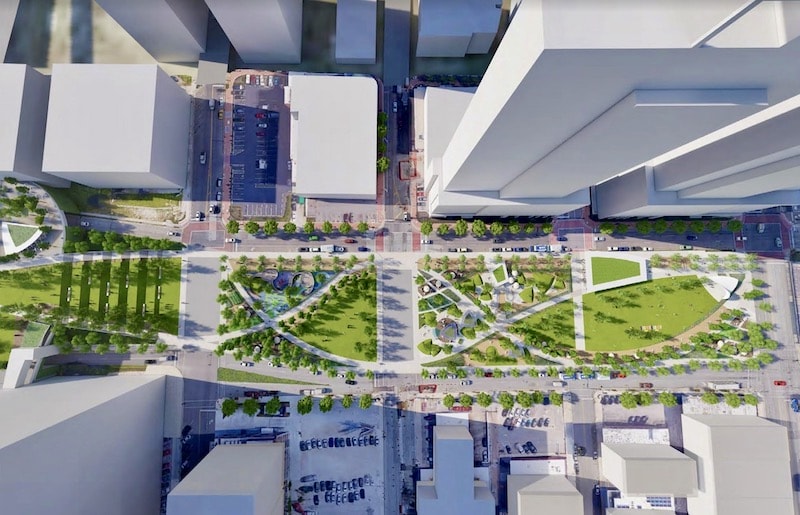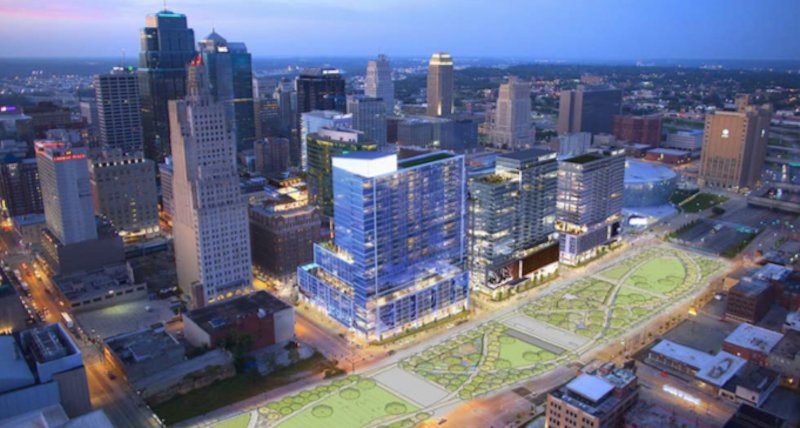Port KC Takes New Role Steering $160M South Loop Link Park Plan

Published September 2nd, 2022 at 10:30 AM
By Kevin Collison
Planning for the proposed South Loop Link, an ambitious proposal to deck four blocks of the disruptive downtown freeway with a park, is taking a big step forward with Port KC assuming a lead role in implementing the project.
The public agency has issued a request for qualifications (RFQ) to hire a firm to perform an environmental assessment for the estimated $160 million plan. The goal is for all or at least a segment of the park deck to be completed by 2026.
Port KC is leading an effort that’s been spearheaded by the Downtown Council, a group of business and property owners, for more than a decade, and has been endorsed in recent years by city, state and federal officials.
Jon Stephens, Port KC executive director, said his agency was chosen to issue the RFQ and likely will continue having a big role because of its expertise in environmental remediation, redevelopment, collaboration with other agencies and public financing capacity.

The South Loop was built in the 1960s to speed traffic, but is now considered a noisy barrier dividing downtown. (Photo from Port KC RFQ)
“Port KC is excited about stepping into this role to utilize the expertise we have, not only to get this project over the finish line, but to make certain we’re able to accelerate the development timeline to get it finished as quickly as possible for the benefit of the community,” he said.
The South Loop, officially designated I-670, was built in 1960s during an era when creating freeways to speed traffic in and out of downtown was considered progress. Now however, the highway trench is seen as a barrier between central downtown and the Crossroads.
Local leaders are looking to Klyde Warren Park in Dallas as is an example of a successful freeway decking project. The park, which opened in 2012, covers a three-block stretch of a freeway between the city’s Uptown neighborhood and downtown.
“Reimagining the I-670 corridor as an urban park is one of the most important projects included in the Imagine Downtown KC 2030 Strategic Plan,” Bill Dietrich, president and CEO of the Downtown Council, said in a statement.
“It could reposition Downtown KC economically for the next 50 years…The Downtown Council looks forward to a future where the South Loop Link Park is a public space for the entire community to gather.”

A conceptual plan for the South Loop Link Park shows Walnut Street would be blocked. Main and Baltimore streets would continue through the park. (Rendering from Port KC RFQ)
The proposed park deck would cover the South Loop four blocks from Wyandotte on the west to Grand on the east. And in a potentially controversial idea, would block Walnut Street. Access through the park on Main and Baltimore would continue.
“This park will have a transformational impact on downtown and this city,” City Manager Brian Platt said in a statement.
“It will reduce the harmful environmental impacts of the highway, it will create much needed green space downtown, it will unlock development potential south of 670, and it will create a new destination attraction for the entire region.”
Stephens said the plan ultimately calls for the park itself to be owned and maintained publicly, and its operation and programming handled by a non-profit group, similar to the one used in Dallas.
The RFQ being issued by Port KC also roughly outlines a general map of how the project would be financed, calling for equal, one-third participation by local, state and federal sources.
Locally, it calls for $20 million in private funding and $33 million from other sources; the state would provide $10 million in tax credits and $43 million from other sources, and the federal government, a $25 million RAISE Grant, and $25 million from other sources.
At a press conference last April at the new Loews Convention Hotel, city officials said the hotel owners had pledged $5 million to begin engineering work. Other private sources expected to contribute include the Cordish Cos. and the Merriman family.

Sen. Roy Blunt was joined by Rep. Emanuel Cleaver and city officials last April to announce funding is in the works to build a park above a four-block stretch of the South Loop. The press conference was held in the lobby of the Loews Hotel.
Sen. Roy Blunt and Rep. Emanuel Cleaver also said at the press conference they were confident federal money will be forthcoming including the $25 million RAISE grant.
“I’m grateful for all of the hard work that is being done at the local and state level to move this project forward,” Blunt said in a statement. “I will continue doing everything I can to ensure the federal resources are in place to get it done.”
Stephens declined to say how much money had been lined up so far for the proposal, but was confident it was enough to begin the planning process.
“We’re confident enough investment is in hand and the planning phase can move forward,” he said.
The owners of Loews as well as Cordish and the Merrimans have a strong interest in seeing the noisy South Loop freeway capped.
The Loews Hotel is adjacent to the highway trench as is the Cordish Two Light and Three Light apartment towers. The Merriman interests own the new 1400KC office building overlooking I-670 at 14th and Baltimore.
There’s also a proposal for a 500-unit apartment development by the South Loop at 15th and Main being pursued by an entity that includes Cordish and J.E. Dunn.
The RFQ being issued by Port KC expects replies by Oct. 3 and will then be considered by a panel with a final decision by the end of October.

A park above the South Loop would directly front apartment towers being developed by the Cordish Co. (HNTB)
In addition to an environmental assessment, the RFQ expects the successful applicant to prepare a conceptual plan that includes phasing of construction, a set of 30 percent design plans and identifying any right-of-way and properties needed to be acquired.
Stephens said the decision to have Port KC issue the RFQ could shave 10 months or more off the project timetable.
“The process allows for much faster coordination on design needs by the Missouri Department of Transportation and the Federal Highway Administration and could reduce total time to completion by months,” he said in a statement.
He added in a separate interview, “I’m optimistic and hopeful we have the project or phases of the project open in 2026.”
As to whether Port KC may be the lead agency in issuing potential bonds for the South Loop Lid plan and be the public entity owning and maintaining the park, Stephens said that’s not been decided.
“Port KC has expertise in owning and operating large public spaces,” he said, referring to Berkley Riverfront Park and the Riverfront Trail.
“We have the expertise and staff to assemble these complex public projects and we have the relationships that go way beyond being an incentive agency,” he said.


